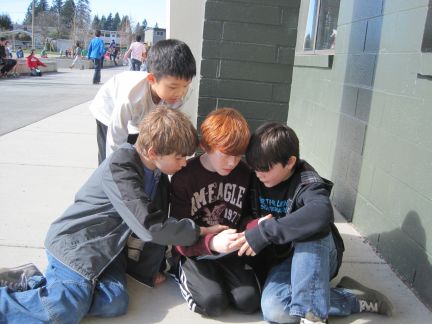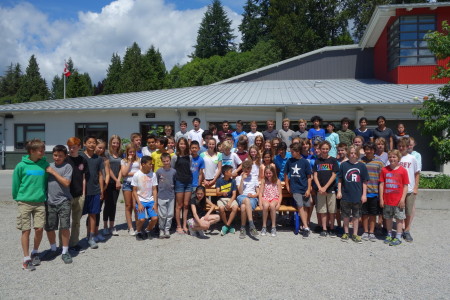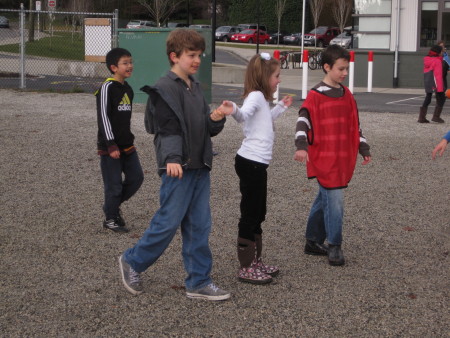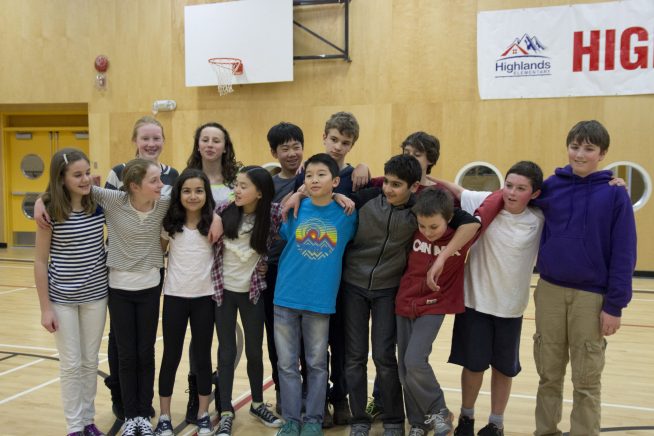Kindness is Priceless
by Carmen G. Farrell, Executive Director, SEEDS (the Social Emotional Empathy Development Society) www.seedsociety.ca
Sometimes in my world I hear things like “Why should we care about having kids with special needs in regular classrooms? It’s expensive. What does everyone else get out of it? ”
I’ll tell you: they get kindness. My son’s classmates learn how to be kind in a way that no curricula or well-intentioned school or community program ever can teach them. Kindness becomes part of their character. Here’s how it’s working for the kids who are growing up with my son Ges (“Jess”).
In 2012, about two-thirds (40+) of my son’s fourth grade class volunteered to be part of a recess and lunchtime social group to help their classmate Ges (“Jess”) be a part of what they were up to on the playground. This was remarkable because school systems are used to maybe half a dozen kids volunteering to be a part of these “friendship” groups to support classmates with special needs. By Grade 4 my son’s physical disabilities were preventing him from participating in playground games as he had when they were little…when playing simple games of “hide n’ seek” and digging in the sand box was what recess and lunch was all about.
From the beginning, the kids were in charge of what happened in the Club, and it’s purpose was to help Ges participate in typical playground games. Different forms of tag were played on a smaller playing field, the person who was “it” wore a piney to be extra visible, or “California Kickball” was played with modified rules. The kids stayed engaged over the years and changed what they did as they got older. They showed their care for Ges…it wasn’t always about him fitting in to what they wanted to do…they got involved in his interests too. Lego-building sessions, banana bread-baking, yoga classes, crazy balloon volleyball, and a myriad of bizarre versions of tag were fun for everyone.

Over the years, within that cohort of 60 plus kids, it was clear they ALL had my son’s back in a myriad of ways. In Highlands Elementary, it was cool to be kind to Ges. “Hi Ges!” in the hallways from kids of all ages, assistance with lugging a rolling backpack up a flight of stairs, invitations to play every single day, and always: “how are you?, what do you think?, what did you do on the weekend?… invitations to join in conversation that is so hard for my son because he has to type it into an iPad with a voice-output device. And then the person listening has to have patience, curiosity, and time.
At first, it was hard to figure out. What on earth were these kids getting out of the equation? My son has great difficulty being “a friend”…on any critical dimension an impassive observer could wonder what the typical kids get out of their interactions with Ges.
But I get it now. In those acts of inclusion and kindness, they were seeing parts of themselves they liked, and self-directing their own social and emotional development. Displaying an emotional maturity beyond their years, their Grade 5 and 6 classroom teacher observed, “Kids this age are usually egocentric; these kids are empathetic.“
But what about the impact of all of this on my son? How is he different from this experience? Scroll forward to 2015 and these kids’ last year of elementary school: Grade 7. Every year the “graduating” class gives a gift to the elementary school. Sometimes it’s a piece of art, or a piece of needed school equipment. Ges’ class gave Highlands a
“Buddy Bench”. The concept is simple: it’s a safe place where a child can sit at recess or lunch when they`re looking for other people to be with. The kids know it’s a place to be kind, to say “yes” to an invitation to play, and to include others. In important ways, this has been the core message of “Club G”: be kind, include others, suspend your judgements.

The Grade 7’s left a legacy of friendship, kindness and inclusion. A physical bench, designated on the playground where kids know they will always be accepted. It took months of planning and many meetings of the students, partly because local high school students built it for them in their shop class.
They also decided on an inscription for the bench plaque:
“Highlands’ Buddy Bench:
a GESture of Friendship”
from the Grade Seven Class of 2015
Ges was a part of these meetings to decide what the bench would look like, how friends would be available on the bench, some basic ground rules about what’s ok with the bench and what’s not. Ges didn’t say much about it. Partly because to do so requires so much effort for him. Ges’ muscles won’t do what he wants them to. This makes his speech unintelligible. He “talks” with an iPad (it sounds a bit like a robot speaking), but not a lot. So it’s hard to know what he’s thinking lots of times.
At the same time, Ges was scheduled to visit his new high school. At first he didn’t want to go and refused to talk about it, typing on his iPad “stay at Highlands” and running from the room. But when he came back from his first visit to his new high school, he was excited. When I asked him what he was most excited about, he typed:
“The woodworking room.” Cool, I thought. Later, I asked him why…
“Because I want to build furniture.” said the iPad voice.
I can be slow to catch on to things…
“What kind of furniture?”
“A bench.” Ges typed. And then he hugged me.
If Ges has his way, he’s going to build buddy benches for younger kids when he’s in high school.

These “Club G” kids are growing up together showing each other compassion, day in and day out. It’s just become who they are; they don’t know any different. And in my son, these kids have taken a vulnerable child, their friend, treated him with nothing but kindness and inclusion…and helped create a kind person who wants to “pay it forward” too.
So these kids are growing up together, teaching each other about empathy and inclusion. When these kids grow up and start shaping their adult world to fit their paradigm where kindness and compassion are their “MO”, I predict the benefits to all of us will be priceless.
Perhaps policies of inclusion are actually a bargain?
